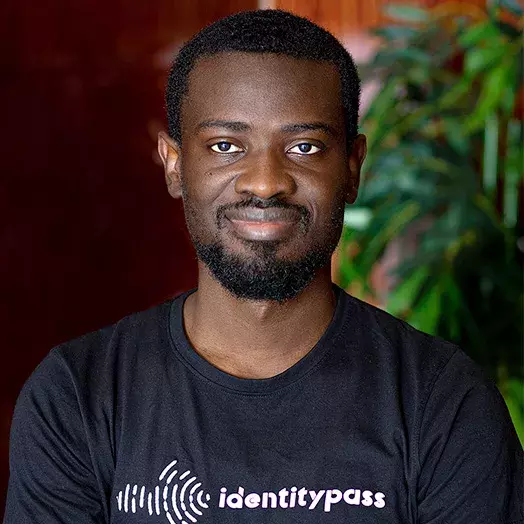Artificial Intelligence is revolutionizing authentication processes, and one Carey student’s security solution is changing the way African countries verify identities.

Identity verification business makes “Most Disruptive MBA Startups” list by expanding global economic access
Lanre Ogungbe, MBA ’23, is changing the face of global economic access with his start-up Prembly, which recently made the Poets & Quants list for Most Disruptive MBA Startups of 2023.The firm’s signature service Identitypass uses facial recognition technology, data, and document verification algorithms to help those living in emerging markets to access an array of products and services. Prembly has already attracted $3.1 million in investment funding and is processing two million verifications a month using facial recognition technology.
The idea for Identitypass came to Ogungbe in 2019 in Nigeria, when he wanted to make a purchase but had forgotten his wallet. The first-hand frustration got him thinking about connecting artificial intelligence with Know Your Customer technology, or KYC, for buying something without cash or cards on hand.
“I thought to myself, ‘Why can’t I just pay with my face?’,” he said. “‘I know it’s me so how can I make them know that too?’”
Now, less than four years after that frustrating experience of forgetting a wallet, Identitypass is a compliance and security solution and the fastest-growing data verification provider in Africa. It serves not only Nigeria but also Kenya, Sierra Leone, Ghana, South Africa, Uganda, the United Kingdom, and the United States.
Utilizing artificial intelligence
Identitypass uses AI in a variety of ways, the biggest one being individual facial recognition. And while the company has perfected its verification system, the founders are investing in new AI technologies to understand cultural distinctions.
“Many people in the African countries have tribal marks, and technologies usually do not take that into consideration,” Ogungbe explained. “We are working to include that more and more into our services. When we see tribal marks, we’d like for everyone to know the region they belong to.”
An equitable playing field
Identitypass recognizes government-issued IDs, passports, phone numbers, credit history, tax records, and more to help verify that an individual or business is real. Their system can spot fraudulent activity within seconds, reducing a process that would normally take weeks to do in some African countries.
Ogungbe says one unique aspect of their efforts is their work with customers in developing markets.
“We have customers in the UK, India, Canada, Australia, the United States – all big markets. But the biggest chunk of our customers is in Africa,” he said. “We work with customers or banks in Kenya who, as an example, might be receiving money from someone in the United States. We will help the bank verify both individuals before the money goes through,” he said.
Ogungbe says over 800 million people globally do not have any form of identification. Of that number, 85 percent are in Africa. Not having ID means they are cut off from many products and services.
“Because of our system, there are more people who typically wouldn’t have access to credit facilities being verified. We’re now seeing so many fintechs providing credits and loans to people based on the verification of their phone numbers, or addresses,” he said. “We are providing financial inclusion to many of the African countries.”
On the company level, Identitypass can verify businesses outside the region to make it possible for their products to be globally available. “No one should be cut off from having the same level of quality and services as other markets just because they cannot be verified,” he said.
The company is also able to provide background checks to prove work history and identity. As a result, there are more job opportunities for people in emerging markets.
What to Read Next

career outcomes
Carey alum leads efforts to eliminate Louisiana’s digital divideUnderstanding the language
Ogungbe says the company moves all aspects of the data – sourcing, labeling, modeling, and languages – into its AI stack to be coded on the back end, so customers can easily understand the front end. Understanding those technologies, languages, and models was the direct result, he says, of his Data Science: Artificial Intelligence course at Johns Hopkins Carey Business School.
“I’m now able to jump in and provide my own opinions. I know what it means to build an AI system and what is needed. I can look at the operational side of the business, understand the language, and help improve our whole AI stack,” he said.
That’s not the only net gain from his time at Carey. When dealing with large companies and investors, Ogungbe says he’s the first to hop on a call with executives to negotiate.
“Using my business communication and negotiation skills, I understand how to operate as a business owner. I’ve utilized the skills from those courses in my business, and I think they are a large part of why we are successful today.”


